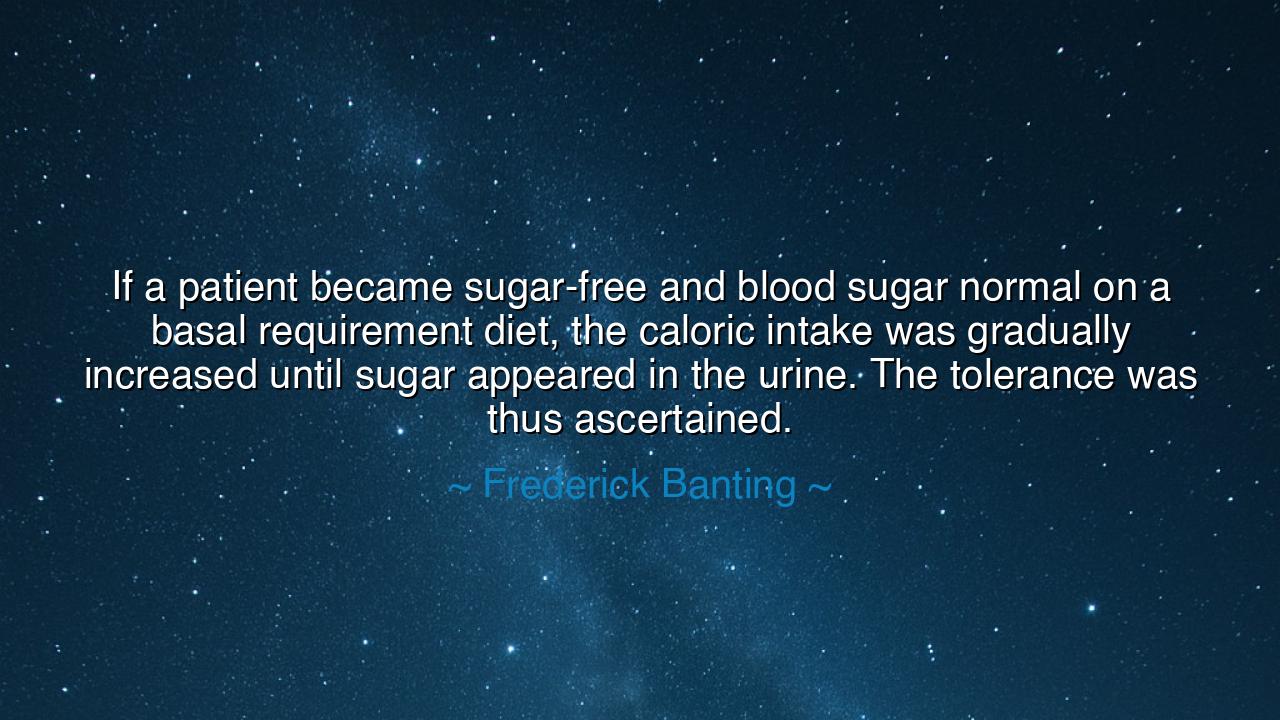
If a patient became sugar-free and blood sugar normal on a basal
If a patient became sugar-free and blood sugar normal on a basal requirement diet, the caloric intake was gradually increased until sugar appeared in the urine. The tolerance was thus ascertained.






In the meticulous and reverent words of Frederick Banting, discoverer of insulin and savior of countless lives, we find not only the record of medical procedure but the echo of human triumph: “If a patient became sugar-free and blood sugar normal on a basal requirement diet, the caloric intake was gradually increased until sugar appeared in the urine. The tolerance was thus ascertained.” To the modern ear, this may sound like the language of science — dry, clinical, almost detached. Yet beneath these measured words beats the pulse of discipline, discovery, and compassion, for they were born from the struggle to wrest life from the grip of death. In this methodical experiment lies a story as noble as any found in legend: the story of how a man’s persistence illuminated the path between suffering and salvation.
The origin of this quote lies in the dawn of one of medicine’s greatest breakthroughs — the discovery of insulin in 1921. Before this moment, the disease known as diabetes was a slow and cruel death sentence. Patients wasted away, their bodies consumed by their own hunger for energy that their blood could no longer nourish. Physicians could only prolong life through severe dietary restriction — starvation diets that turned vitality into frailty. It was in this desolate field of suffering that Frederick Banting, a young Canadian doctor, set forth his quiet revolution. His words above describe part of the experimental discipline by which he and his team tested insulin’s effects — step by painstaking step, they measured life’s return to the dying. Every increment of caloric increase, every trace of sugar tested, was not mere data; it was the fragile edge between despair and hope.
The ancients would have recognized in Banting’s work the sacred virtue of temperance — the balance between too much and too little, between abundance and ruin. The discipline he describes is not only scientific but philosophical. To increase the diet gradually, to watch carefully for the body’s limit, to ascertain its tolerance — this is an act of profound respect for life’s delicate equilibrium. It recalls the wisdom of Hippocrates, who taught that medicine is not the conquest of nature, but its partnership; that healing requires patience, humility, and an ear attuned to the quiet rhythms of the body. Banting’s words are the modern echo of this ancient truth: that to heal is not to overpower, but to understand.
Consider, too, the heroic context in which these words were written. In the laboratories of the University of Toronto, Banting and his assistant Charles Best toiled in obscurity, their nights sleepless, their funds scarce, their experiments met with doubt. Yet they persisted. In 1922, when a child named Leonard Thompson lay dying of diabetes, Banting administered the first purified injection of insulin. The boy’s transformation was nothing short of miraculous: his thirst vanished, his energy returned, and for the first time in history, a disease once thought terminal was reversed. It was as though Prometheus had stolen fire from the gods — a quiet flame, this time, distilled from the pancreas, lighting the way for all who suffer.
In this light, the quote is not merely about the measurement of blood sugar; it is about the measurement of endurance. Banting’s words embody the spirit of all who labor for truth — those who must proceed slowly, carefully, faithfully, increasing the “caloric intake” of their dreams until they find the body’s tolerance for hope. His method teaches that all progress must be tested, that strength cannot be assumed, and that wisdom grows through the patience of small adjustments. The tolerance of the human body, like the tolerance of the human spirit, is revealed only through persistence guided by humility.
From this story arises a broader teaching. Just as Banting increased the diet of his patients cautiously, so too must we increase the demands we place upon ourselves. To grow in body, mind, or virtue, we must learn our limits through experience, not arrogance. The ancients said, “Nothing in excess,” for excess blinds, but discipline refines. Banting’s careful science mirrors the moral law of life itself: to expand gradually, to observe, to balance — for in balance lies both health and harmony.
So, my child of the future, learn from Frederick Banting’s quiet heroism. Approach your work, your goals, your very life, with the same reverence he gave his patients — one measured step at a time. Do not rush toward glory, nor despair at delay. Instead, build slowly, test your limits, and increase your capacity with patience and gratitude. For every discovery — whether of medicine or of the soul — is found not through haste, but through discipline wrapped in compassion.
And remember always: Banting’s words, though scientific, conceal a spiritual truth — that the healing of the world depends not on miracles alone, but on the steadfast courage to observe, to learn, and to nurture life gently back to its strength. Through his steady hand, the starving lived again, and through his method, we are reminded that true greatness lies not in sudden conquest, but in the patient art of restoration — the art of finding the body’s, and humanity’s, tolerance for light.






AAdministratorAdministrator
Welcome, honored guests. Please leave a comment, we will respond soon